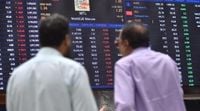The official website of the Pakistan Stock Exchange (PSX) went offline today, hours after India announced a series of retaliatory measures in response to the Pahalgam terror attack, which claimed 26 lives. The attack, carried out by the Lashkar-e-Taiba-affiliated Resistance Front (TRF), has escalated tensions between the two nations. The tragedy unfolded in the serene Baisaran Valley, a popular tourist destination, where militants targeted visitors based on their faith, forcing them to recite religious verses before opening fire.
The PSX website reportedly went offline shortly after India’s retaliation to the recent Pahalgam terror attacks. Visitors to the site were greeted with the message, “We’ll be back soon. PSX website is under maintenance until further notice.” On Wednesday, April 23, the exchange closed over 1,300 points lower, marking a 1.10% drop to settle at 1.17 lakh points.
India’s retaliation included diplomatic downgrades, suspension of the Indus Waters Treaty, and closure of key border routes. Following the tragic Pahalgam terror attack, the Indian government has implemented a series of decisive measures to strengthen security and hold the perpetrators accountable. These include the suspension of the Indus Waters Treaty, halting trade through the Wagah-Attari border, and revoking visa exemptions for Pakistani nationals under the SAARC framework.
On Thursday, April 24, 2025, the PSX experienced a significant decline, with the KSE-100 index falling by more than 2,000 points. The benchmark index opened sharply lower, dropping 2.12% or 2,485.85 points to 114,740.29 within the first five minutes of trading. As the day progressed, the index closed at 115,019.81, down by 2,206.33 points or 1.88%, from the previous close of 117,226.14.
The sharp drop in the PSX followed another significant decline on Wednesday, when the index fell by 1,204.21 points. This downturn was compounded by the International Monetary Fund (IMF) cutting Pakistan’s GDP growth forecast to just 2.6% for the current fiscal year. Investor confidence has also been shaken by broader economic and political challenges, including concerns over Pakistan’s weakening currency and rising geopolitical tensions.
Yousuf M. Farooq, director of research at Chase Securities, noted, “The market opened lower amid fears of escalating tensions between Pakistan and India. However, positive corporate earnings have supported a partial recovery.” He emphasized that investor sentiment will hinge on the trajectory of India-Pakistan relations, upcoming corporate results, and the monetary policy decision expected in early May.
Meanwhile, the Indian rupee recorded its worst performance in two weeks on April 23 and continued to weaken on April 24, falling to 85.6625 against the US dollar. Concerns over New Delhi’s response to the Pahalgam attack have led to unease among traders, with the dollar/Indian rupee forward premiums rising alongside the Indian rupee’s decline.
In India, the stock markets did not react as strongly to the news. The BSE Sensex was down 233 points, or 0.29%, while the Nifty50 dropped 69 points, or 0.28%, as of early trading on Thursday. Vinit Bolinjkar, Head of Research at Ventura Securities, stated that while a potential military response from India could lead to brief market disruptions, a broader trend reversal is unlikely unless the conflict escalates dramatically.
The geopolitical tensions have not only affected the stock market but have also led to significant diplomatic actions. India has placed the 1960 Indus Waters Treaty on hold, signaling a firm diplomatic stance against Pakistan until it effectively addresses cross-border terrorism. The closure of the Attari-Wagah Border has halted cross-border movement, with a deadline of May 1, 2025, for individuals in India with valid documents to return.
Visa restrictions have also been implemented, with the SAARC Visa Exemption Scheme for Pakistani nationals suspended and previously issued visas canceled. Pakistani nationals under this scheme have been given 48 hours to leave India. Additionally, Pakistani military, naval, and air advisors have been declared persona non grata, with a week to leave. India is also withdrawing its advisors from Islamabad, reducing high commissions in both nations from 55 to 30 personnel.
As the situation continues to unfold, Pakistan has convened a meeting of the National Security Committee to deliberate the resulting circumstances. Deputy Prime Minister and Foreign Minister Ishaq Dar stated that Pakistan would issue a “comprehensive reply” to India’s actions, emphasizing that New Delhi had not provided any evidence linking Islamabad to the attack. “Expressing anger over terror incidents in such a manner is unjustified,” Dar said, accusing the Modi-led government of shifting blame for its internal failings onto Pakistan.
Investors remain cautious, weighing potential additional responses from India and Pakistan. The volatility in the market reflects the uncertainty surrounding the geopolitical landscape, with many looking for clarity on how the situation will develop. Given the backdrop of rising tensions and economic instability, analysts warn that any short-term dip could offer a compelling buying opportunity for long-term investors.
As the PSX faces these challenges, the focus remains on the evolving relationship between India and Pakistan, as well as the broader economic implications of these geopolitical tensions. The market's reaction to these developments will be closely monitored in the coming days, as both nations navigate this precarious situation.






